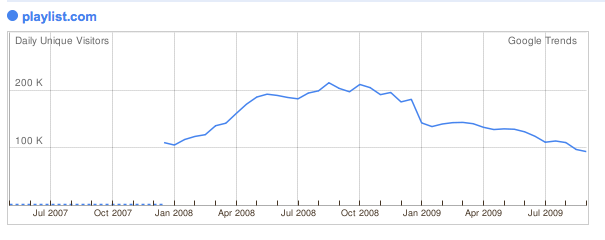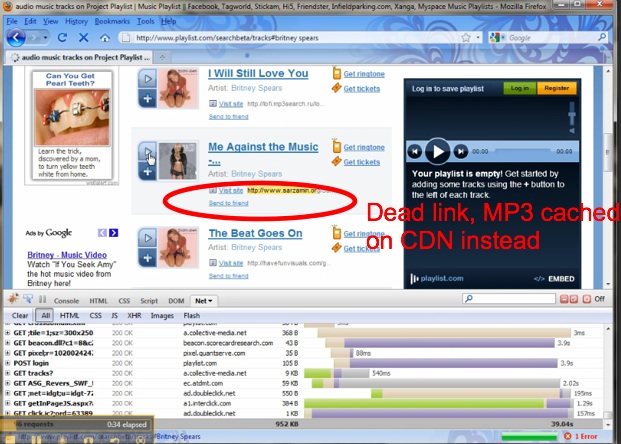If there is a poster child for the battered Web music startup, Project Playlist is it. The company had to fight lawsuits from the record labels, is still trying to iron out licensing deals with those labels, lost its last CEO Owen van Natta to MySpace, lost its CFO Mike Sheridan, and by the looks of it is losing its audience. What else could go wrong?
Well, it looks like the self-styled music search engine is actually hosting MP3s of major label artists via content delivery networks such as Limelight. If you search for Britney Spears songs, for example, the second result is “(You Drive Me) Crazy.” The originating site where the MP3 was hosted, http://www.sarzamin.org/, is no longer available. But not to worry because Project Playlist cached the song on its CDN, Limelight Networks. Khalid Shaikh, a TechCrunch reader and developer who wanted to harness Project Playlist to create his own music site, discovered this arrangement and sent me the screencast above to prove it.
In the video, Shaikh speculates on the legality of this method of caching, which is impossible to say one way or the other without knowing the terms of Project Playlists’ licensing agreements with the labels. Project Playlist does have a licensing agreement with Sony, which owns the Zomba Label that Spears is on. But it certainly is a strange way to build a catalog of songs. And there are plenty of other examples, such as Alanis Morissette, who is on Warner Music, which is the one major lbel that still has not dropped its lawsuit against Project Playlist.
Project Playlist bills itself as a music search engine that lets people share playlists, not the songs underlying those playlists per se. On its About page, here’s how the service describes itself:
Playlist.com is an information location tool similar to Google® and Yahoo!® but devoted entirely to the world of music. Our purpose is to help you find and enjoy music legally throughout the web in the same way that other search engines help you find webpages, images, and other media
and . . .
Playlist.com allows you to discover all of this free music legally because we respect the rights of copyright holders and we insist that you do as well. . . . If an artist tells us that our search engine is linking to an illegally posted song, we will immediately take down the link to that music file.
The site doesn’t say anything about caching songs which have been taken down, for whatever reason, from other sites. But it does raise some interesting questions. Has Project Playlist crossed the line from a music search engine merely indexing the music that is already freely available on the Web to a music hosting service (albeit through its CDN proxies)? Or is Project Playlist acting just like Google or any other search engine here, merely caching the most popular content in its index?
When I contacted Josh Brooks, vice president of programming and content, he seemed genuinely surprised and said that this is the first time he’s ever seen anything like that. After viewing the screencsat, he says:
“Watching that troubles me and it should trouble anyone trying to do anything n digital music. It is a problem that has to be fixed. All I can say is it is going to be remedied because it needs to be.”
He also says that Project Playlist is in the middle of negotiations with labels to stream licensed songs directly:
“Playlist.com technology neatly aggregates song searches on the web and directs a user to a stream of music from the site where the song is hosted. In the very near future, our hosted music service will find a linked stream and replace it with a stream from the broad library of music we have licensed. Users can then listen and share the music on Playlist.com or through an off-site embeddable player. There are dozens of linked services out there. Playlist is actively working with the content owners to insure proper reporting and accounting for music we have licenses for.”
in other words, Project Playlist doesn’t want to be a music search engine anymore. It is already moving away from through the way that it is caching songs, but it needs to host those songs in a more straightforward manner if it wants the labels to take it seriously.

